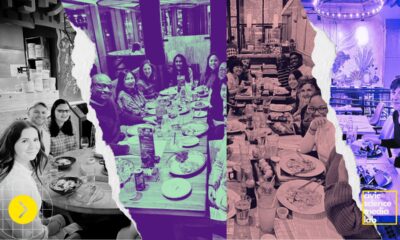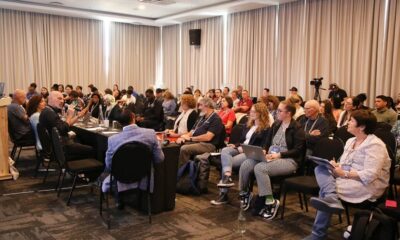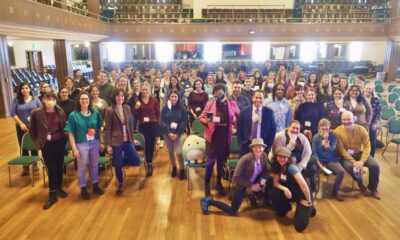Civic Science Observer
The 2024 ASTC conference kicks off Sept 27: Here’s what to expect

Starting on September 27, 2024, the Association of Science and Technology Centers (ASTC) will host its annual conference in Chicago that will gather science-engagement professionals to discuss the latest trends in public engagement. The first annual ASTC conference was hosted back in 1978 with Chicago serving as a host city back in 1983. The conference this year is using session tracks and engagement tags to assist the 2000 or so attendees navigate the diversity of engagement opportunities provided by the conference. Session tracks include trends and innovation, leadership and direction, community and partnerships, and several more.
The ASTC mentions that “this year’s sessions span timely topics like AI, inclusion and accessibility, and planetary health, as well as core science engagement issues and practice.” They further state that this year’s week long conference will “highlight the diverse array of ASTC members in the Chicago area,” including local institutions such as the Field Museum, Adler Planetarium, and Griffin Museum of Science and Industry. Attendees will have the chance to explore these organizations through sessions, site visits, and collaborative events.
One of the conference’s special features are the preconference intensives, which offer in-depth workshops such as Make_X: Engaging the Creativity of the Individual, Exploring and Planning for Digital Immersive Exhibits at Your Museum, and Evaluation and Educator Leadership in Museum Makerspaces. These highly interactive sessions provide focused learning and networking opportunities before the main conference.
Engagement tags categorize sessions by their format and level of participation thus providing an additional layer of navigation for those attending the conference which is jam packed with sessions. For example, experiential sessions involve hands-on activities, while group discussions encourage active audience participation. Hands-on showcases offer short, interactive demonstrations, and lightning sessions group quick presentations on specific topics. Other formats include panels, poster presentations, and solution labs, ensuring that attendees can engage in ways that suit their learning preferences.
How many sessions can participants navigative? Well, there will be a total of 8 lightning sessions across diverse topics such as Teens and Youth Engagement with talk titles such as Beyond Workforce Development: Using STEM to Foster Youth Leadership and Advance Social Justice, Youth Volunteers: Engagement Beyond the Galleries, and Using Unique Field Experiences to Introduce Diverse Audiences to STEM Fields.
There will be a total of 55 posters with titles such as Building Insights Through Observation: An Arts-Based Model for Building STEM Data Literacy, From Deep Space to the Deep Sea: Incorporating Current Research into Education and Exhibit Programs, and Leveraging Community Expertise to Advance Sustainability Goals.
A total of 32 panels will take place with titles such as Leading with the Arts: Centering Arts-Based Methods for Deeper Science Learning and Navigating Methods for Integrating Community Knowledge and Values into Museum Practice.
The list of ways to engage at the conference is impressive. There will be 18 experiential sessions, 8 solution labs, 9 hands-on showcases, 16 preconference intensives, and 24 group discussions. As of early July, the ASTC conference mentioned that 90+ exhibitors will be attending and that number is probably much higher at the time of this writing. Despite the fact that over 85% of conference attendees will be those making decisions for their science museums, the conference clearly offers something for anyone involved in science engagement whether doing scholarship and/or practice.
Energy and excitement are pretty much guaranteed.
Dr. Rose Leach, the David and Jane Cohn Scientist at the Science Museum of Virginia, told the Civic Science Times the following:
“While I have been in the museum field for over 5 years, this will be my first ASTC conference. I am excited to not only learn about the latest initiatives in teen community science, but also connect with other museum practitioners to share/combine our efforts in STEM research, outreach, and communication.”
In their reflection from last year’s conference, Museums & Race (a volunteer-led organization of museum professionals) mentioned high levels of enthusiasm during their DEAI-focused panel at ASTC 2023. They note that attendees were particularly interested in understanding how to implement DEAI initiatives within their institutions, with questions centering around financial support, staff buy-in, and accountability. However, they mention that many participants felt they needed more time to delve into these complex topics, highlighting a desire for deeper engagement (read the full reflection here).
The Big Picture
The ASTC conference is part of a broader community of dedicated public engagement conferences that aim to strengthen connections between science engagement scholars, practitioners, and other stakeholders. Other conferences include SciTalk by the Association of Science Communicators, Public Communicaton for Science and Technology, National Science Policy Network, and ComSciCon, which share missions that overlap around fostering learning, networking, and collaboration across their respective areas within the broader civic science landscape.
However, these conferences face many challenges, most notably around funding to host them and ensure that they remain accessible to all. Tracking the impact over the long term and publishing the insights is also a challenge. For attendees, navigating and prioritizing the growing list of conferences is also a challenge. Ultimately, how the ecosystem of public engagement conferences continues to evolve will be important for scholars to keep tracking and studying.
Fanuel Muindi is a former neuroscientist turned civic science ethnographer. He is a professor of the practice in the Department of Communication Studies within the College of Arts, Media, and Design at Northeastern University, where he leads the Civic Science Media Lab. Dr. Muindi received his Bachelor’s degree in Biology and PhD in Organismal Biology from Morehouse College and Stanford University, respectively. He completed his postdoctoral training at MIT.

-
 Audio Studio1 month ago
Audio Studio1 month ago“Reading it opened up a whole new world.” Kim Steele on building her company ‘Documentaries Don’t Work’
-
Civic Science Observer1 week ago
‘Science policy’ Google searches spiked in 2025. What does that mean?
-
Civic Science Observer1 month ago
Our developing civic science photojournalism experiment: Photos from 2025
-
Civic Science Observer1 month ago
Together again: Day 1 of the 2025 ASTC conference in black and white
Contact
Menu
Designed with WordPress
























